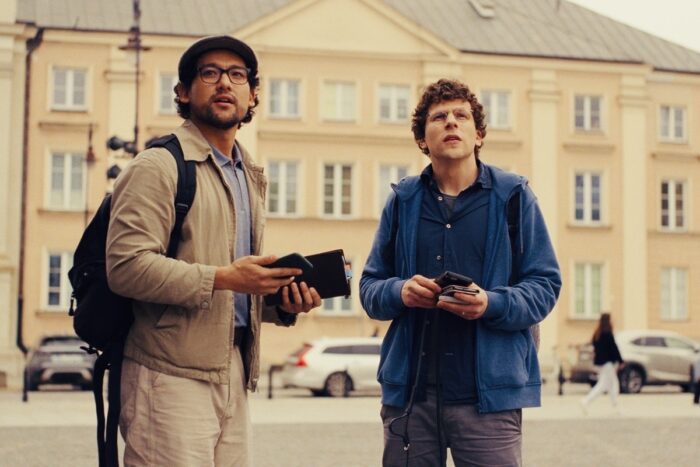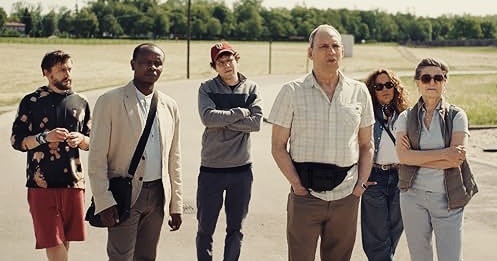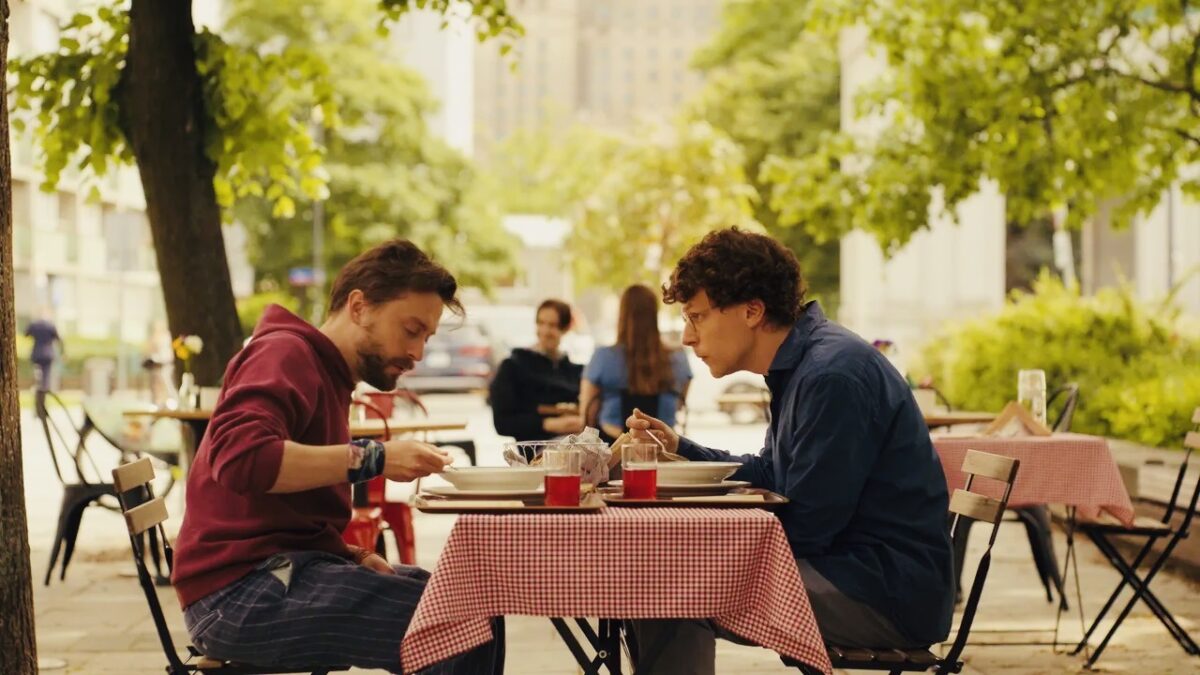Two American Jewish cousins embark on a road trip in Poland, their ancestral homeland, in the quest to connect with their family roots. This is the alluring theme of Jesse Eisenberg’s enticing feature film, A Real Pain, which is a contender for two Oscars at tonight’s Academy Awards ceremony in Hollywood.
Their odyssey is facilitated by the generosity of their recently deceased grandmother, Dory, a Polish Holocaust survivor. She allocated money in her will so that her grandsons, David Kaplan (Eisenberg) and Benji Kaplan (Kieran Culkin), could visit Poland, whose Jewish population was virtually decimated by Nazi Germany.
During their guided tour, they stop in Warsaw, Lublin and Majdanek, the former extermination camp, and then travel to an unnamed town where Dory was born and raised.

Their British guide, James (Will Sharpe), a non-Jew, possesses a wealth of knowledge about Polish Jewish history and the Holocaust. Joining the tour are Marcia (Jennifer Grey), the daughter of a Holocaust survivor and a divorcee; Eloge (Kurt Egyiawan), a convert to Judaism who witnessed the genocide in Rwanda, and Diane (Liza Savoy) and Mark (Daniel Oreskes), a middle-aged Jewish couple who are little more than peripheral figures.

The film focuses on David, a socially awkward secular Jew who works in digital ad sales in New York City and is married to a Hindu American, and on Benji, a drifter from upstate New York with no wife or discernible job. They’re related by virtue of the fact that their fathers are brothers.
Eisenberg, and particularly Culkin, turn in convincing performances. Eisenberg also wrote and directed the film. Culkin has been nominated for an Oscar in the best supporting actor category. Eisenberg’s original screenplay is up for an Academy Award.
Although David and Benji have not seen each other for a while, they’re glad to be travelling together in Poland. Benji is grateful that David has taken time off to join him on what promises to be a unique heritage trip. Nonetheless, they sometimes grate on each other’s nerves. Benji, charming yet troubled, tends to exhaust David, who envies his cousin’s social skills.
The film makes an important point in its first minutes when the group pauses by the imposing monument honoring the Jewish fighters of the doomed 1943 Warsaw ghetto uprising. In a succinctly apt observation, James says that they did not go to their deaths like lambs to the slaughter, and that Jews are a resilient people.
As they travel to Lublin in the first-class compartment of a sleek train, Benni’s sensitivities are awakened. He cannot reconcile the disconnect between their luxury tour and the genocidal events that tore Poland’s Jewish community asunder.
These jarring juxtapositions are softened by a gentle, uplifting musical score of Chopin’s ballades, etudes, nocturnes and preludes.
The scenes in Lublin, a city I visited 16 years ago, are redolent of Poland’s storied Jewish past. The Grodzka Gate, through which the old Jewish quarter is accessible, leads to a landscape of loss, as Benji and David discover.
When they reach Lublin’s overgrown Jewish cemetery, the oldest in Poland, James launches into a lengthy explanation that annoys Benji. He dislikes “touristy” sites and gags on too many facts. To Benji, a tour should engage with Polish people and culture. James, in a heartfelt conversation with Benji, agrees with him.
Majdanek, only a few kilometers from Lublin, has an emotional impact as well. Benji is struck by the blue stains on the walls of the gas chamber. He learns that they were created by Zyklon-B gas that asphyxiated its Jewish victims. As he exits the camp, he passes a cage filled with the shoes of murdered Jews. On the bus back to Warsaw, he weeps silently.
Michal Dymek’s cinematography captures the bleak expanse of Majdanek and the sylvan beauty of the countryside.
A Real Pain moves along at a brisk pace and reaches its denouement when David and Benji visit Dory’s childhood home. To Benji, the low-rise apartment building is “so unremarkable.” When they place memorial stones on the doorstep, an older resident grumbles. His son, in serviceable English, smooths over the misunderstanding.
As Holocaust road movies go, this one leaves a marked impression, conveying the idea that the past really matters and is not merely a jumble of irrelevant events. Certainly, this is the takeaway from David and Benji Kaplan’s tour of Poland.
